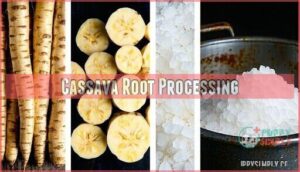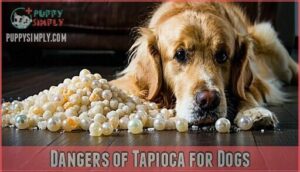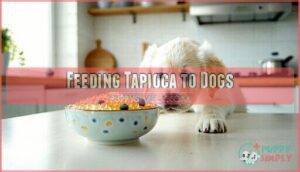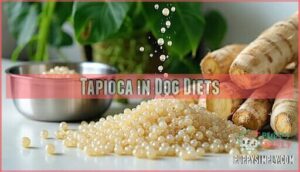This site is supported by our readers. We may earn a commission, at no cost to you, if you purchase through links.

Plain tapioca starch or flour is generally safe for most dogs and won’t cause harm when cooked properly. However, those chewy tapioca pearls can pose a choking risk, especially for smaller breeds.
Think of tapioca as empty calories – it provides quick energy but lacks essential nutrients your pup needs. Some dogs with sensitive stomachs actually tolerate it better than traditional grains.
The key is moderation and proper preparation, but there are important safety considerations every dog owner should know.
Table Of Contents
- Key Takeaways
- What is Tapioca
- Can Dogs Eat Tapioca
- Tapioca Nutrition Facts
- Benefits of Tapioca for Dogs
- Dangers of Tapioca for Dogs
- Feeding Tapioca to Dogs
- Tapioca in Dog Diets
- Frequently Asked Questions (FAQs)
- What are the Benefits of Feeding Tapioca to My Dog?
- Does Tapioca Have Any Nutritional Value?
- How Much Tapioca is Safe for My Dog?
- Is Raw Tapioca Harmful to Dogs?
- How Can I Tell if My Dog is Allergic to Tapioca?
- Is tapioca safe for puppies to eat?
- Can diabetic dogs consume tapioca products safely?
- How much tapioca is too much daily?
- Does tapioca cause weight gain in dogs?
- Can tapioca replace rice in dog food?
- Conclusion
Key Takeaways
- You can safely give your dog small amounts of properly cooked tapioca as an occasional treat, but avoid whole tapioca pearls since they’re choking hazards, especially for smaller breeds.
- Don’t rely on tapioca for nutrition – it’s basically empty calories with 89% carbohydrates and minimal protein, fiber, or essential nutrients your dog actually needs.
- Keep portions tiny (no more than 10% of daily calories) and limit frequency to 2-3 times weekly maximum to prevent weight gain and blood sugar spikes.
- Watch for digestive upset, allergic reactions, or breathing difficulties after feeding tapioca, and never give your dog raw tapioca since it contains toxic compounds from cassava root.
What is Tapioca
You’ve probably seen tapioca pearls floating in bubble tea or used tapioca flour in gluten-free baking, but this starchy ingredient comes from the cassava root, a plant native to South America.
This grain-free starch gets processed from cassava roots and serves as a popular thickening agent in cooking and a carbohydrate source in many dog foods.
Grain-Free Starch Source
Unlike wheat or corn, tapioca stands out as a grain-free starch that’s naturally gluten-free.
You’ll find this cassava-derived ingredient in many grain-free dog foods as a safe alternative to traditional grains.
Processing methods transform the cassava root into pure starch, making it an excellent choice for dogs with grain sensitivities.
Tapioca sustainability makes it an eco-friendly starch alternative.
Many pet owners are now looking at holistic dog food options for their pets.
Native to South America
For thousands of years, cassava cultivation has been the backbone of South American diets, with indigenous communities discovering this versatile root’s potential.
From the Amazon rainforest to coastal regions, cassava root became a dietary staple with deep historical significance.
Regional variations in preparation methods spread throughout the continent, eventually leading to the tapioca starch extraction process that creates today’s dog-safe ingredient.
Cassava Root Processing
You’ll find that cassava root processing removes dangerous cyanide-producing compounds through careful preparation.
Traditional techniques involve soaking, grating, and cooking the cassava plant to eliminate toxicity.
Industrial processing uses advanced starch extraction methods and specialized cooking techniques for complete cyanide removal.
This thorough processing transforms potentially harmful cassava root into the safe tapioca starch you see in dog foods today.
Can Dogs Eat Tapioca
Your dog can safely eat tapioca when it’s properly prepared and given in appropriate portions. This grain-free starch offers a gluten-free alternative that many pet owners find beneficial for dogs with specific dietary needs.
Tapioca safety depends largely on preparation methods and understanding your dog’s individual sensitivities. Most dogs tolerate tapioca well, but breed sensitivities can vary.
Small breeds face higher choking risks with whole pearls, while larger dogs typically handle cooked tapioca without issues. When asking "is tapioca safe" for your pet, consider these key factors:
- Properly cooked tapioca eliminates harmful compounds from raw cassava
- Portion sizes should remain small to prevent digestive upset
- Tapioca dog food ingredients are generally well-tolerated
- Plain preparation without additives guarantees maximum safety
Tapioca benefits dogs by providing easily digestible energy, making it a popular choice in commercial dog tapioca formulations for sensitive stomachs. Similarly, white rice offers benefits as a carbohydrate source for dogs.
Tapioca Nutrition Facts
You’ll want to understand what’s actually in tapioca before sharing this starchy treat with your dog.
Tapioca is basically pure carbs with very little protein, fiber, or essential nutrients, making it more of an energy source than a nutritional powerhouse, with tapioca being the main component of this treat.
High Carbohydrate Content
Since tapioca contains about 89% carbohydrates, it’s basically pure energy for your dog.
This energy density can impact blood sugar levels and weight management if you’re not careful.
While it provides quick fuel, tapioca offers limited nutrients beyond carbohydrates, making balanced diet planning essential for proper dog nutrition.
| Nutrition Factor | Tapioca Content |
|---|---|
| Carbohydrates | 88.7g per 100g |
| Energy Density | 358 calories |
| Blood Sugar Impact | High glycemic index |
| Nutrient Variety | Limited nutrients |
The tapioca’s high glycemic index and energy density are key factors to consider when planning a dog’s diet.
Low Fiber and Protein
Unlike protein-packed ingredients your dog needs for muscle development, tapioca brings limited nutrition to the table.
This low fiber, low protein starch won’t keep your pup feeling full for long, creating satiety concerns.
While tapioca fits into a balanced diet as an occasional treat, tapioca overfeeding can crowd out essential nutrients your dog’s body craves for peak health, creating a situation where your dog may not receive the necessary nutrients for optimal well-being, which can be a result of tapioca overfeeding.
Mineral Composition
Tapioca’s mineral profile offers limited nutritional value for your dog. While it contains trace amounts of beneficial minerals, the quantities remain minimal compared to complete dog foods.
However, it’s often used in dog food as a <strong>safe grain alternative</strong>.
Here’s what tapioca minerals provide:
- Calcium levels support bone health but require supplementation from other sources
- Manganese benefits include metabolic function, though amounts are negligible
- Iron absorption occurs minimally due to low iron content
- Mineral bioavailability varies based on processing methods
Glycemic Index
Understanding tapioca’s GI Impact helps you make smarter choices for your dog’s diet.
This starch ranks moderately on the glycemic index, causing blood sugar levels to rise faster than rice but slower than glucose.
Your dog’s Insulin Response will spike with large portions, making Portion Control critical.
Consider Tapioca Alternatives like sweet potato for better carbohydrate management in your pup’s meals.
It’s worth noting that tapioca is sometimes processed into cassava syrup, a natural sweetener.
Benefits of Tapioca for Dogs
When fed properly, tapioca can offer your dog several health benefits that support their overall well-being.
You’ll find that this grain-free starch provides quick energy, aids digestion, and may even contribute to healthier skin and stronger bones.
Energy Source
Your dog’s body runs on fuel, and tapioca delivers high-octane carbohydrates that convert quickly into usable energy.
This starch provides calorie density that’s especially valuable for active breeds needing sustained energy throughout their day.
Think of it as natural carb loading for your pup’s performance boost.
Many commercial dog food formulas include tapioca specifically for its reliable energy-providing properties.
Digestive Health
Small amounts of tapioca can support your dog’s digestive health through improved stool consistency and gut microbiome balance.
Its fiber content aids nutrient absorption while being gentle on sensitive stomachs.
However, tapioca’s limited digestive enzymes mean it shouldn’t replace balanced nutrition.
Monitor your pup for any stomach issues when introducing this starch to their diet, ensuring you maintain a watchful eye on their overall digestive health.
Skin and Coat Health
With its vitamins and minerals, tapioca can boost your dog’s skin hydration and coat improvement naturally.
The starch provides nutrients that support healthy fur growth while offering allergy relief for dogs with food allergies.
Supplementing diet with tapioca benefits dogs prone to skin issues, though it’s not a miracle cure.
Monitor your pup’s response when introducing this ingredient.
Bone Density Support
While tapioca’s calcium content isn’t groundbreaking, it works alongside other minerals to support your dog’s bone density.
This mineral synergy becomes especially valuable for puppy development and senior support.
Breeds with bone predisposition issues might benefit from tapioca nutrition dogs receive through quality dog food nutritional value, though it shouldn’t replace dedicated calcium supplements.
For senior dogs, consider joint health supplements to help maintain mobility and overall joint health.
Dangers of Tapioca for Dogs
While tapioca offers benefits for your dog, you’ll need to watch for several potential risks that can harm your pet’s health.
Raw tapioca contains harmful compounds, whole pearls can cause choking or blockages, and too much of this starchy treat can lead to weight gain and blood sugar spikes.
Allergic Reactions
While tapioca rarely triggers food allergies in dogs, some pups can develop sensitivities over time.
Watch for these reaction symptoms if you’re introducing tapioca into your dog’s diet:
- Skin irritation, itching, or persistent scratching
- Gastrointestinal upset including vomiting or diarrhea
- Facial swelling or difficulty breathing
Certain breeds show predisposition to food allergies, making allergy testing worthwhile for identifying allergens and managing reactions effectively.
An elimination diet trial is often recommended to diagnose food allergies, helping to identify specific allergens and implement an effective management plan.
Choking Hazards
Whole tapioca pearls present serious choking hazards, especially for smaller breeds.
Pearl size matters—large pearls can lodge in your dog’s throat while smaller ones may slip past.
Never let your pup swallow tapioca pearls whole. If choking occurs, open their mouth, remove visible objects with tweezers, and seek immediate veterinary care.
Prevention beats panic every time, as it is always better to prevent accidents than to react to them, making prevention a key aspect of dog care.
Digestive Obstructions
Beyond choking hazards, tapioca pearls can create serious intestinal obstructions in your dog’s digestive system.
**Tapioca pearls aren’t just choking hazards—they can block your dog’s intestines, turning treats into surgical emergencies.
Pearl size matters—larger pearls pose greater risks, especially for smaller breeds with narrower intestinal tracts.
Watch for obstruction symptoms like vomiting, lethargy, and straining to defecate.
Severe blockages may require surgical removal, making preventative measures your best defense against costly emergencies.
Overconsumption Risks
Even seemingly harmless treats can backfire when you’re too generous. Feeding your dog excessive tapioca creates several serious health concerns that’ll sneak up on you.
The high-calorie content means weight gain happens faster than you’d expect, while blood sugar spikes from overconsumption can lead to long-term metabolic issues.
- Weight gain and dog obesity – Tapioca’s high-calorie content adds pounds quickly, especially in less active dogs
- Blood sugar spikes – The high glycemic index can cause dangerous fluctuations in diabetic or pre-diabetic dogs
- Dental problems – Sticky tapioca residue promotes plaque buildup and tooth decay over time
- Nutritional imbalance – Too much tapioca crowds out essential proteins and vitamins your dog needs
- Cyanide poisoning risk – Improperly processed cassava retains toxic compounds that accumulate with overconsumption
Feeding Tapioca to Dogs
If you’re thinking about giving your dog tapioca, you’ll need to follow some basic safety rules to keep your furry friend healthy.
The key is serving small amounts of properly cooked tapioca while watching for any signs your dog doesn’t handle it well, which involves following a careful approach to introduce tapioca.
Moderation Guidelines
Given tapioca’s risks, smart serving size matters most for your pup’s health.
Limit tapioca treats to 10% of daily calories, with frequency limits of 2-3 times weekly maximum.
Consider your dog’s breed sensitivity—smaller dogs need tiny portions to prevent dog weight gain.
Practice dog food portion control and explore treat alternatives like carrots or apples for safer snacking options.
Preparation Methods
Proper cooking methods eliminate harmful compounds from raw cassava, making tapioca safe for dogs.
Always boil tapioca pearls thoroughly for 15-20 minutes to guarantee complete cyanide removal. Proper boiling guarantees perfect tapioca consistency.
When preparing homemade dog food with tapioca, stick to safe quantities—no more than 10% of your dog’s meal. Simple ingredient pairings like cooked chicken work best for tapioca dog treats.
Safe Alternatives
Several tapioca alternatives offer better nutrition for your dog.
Sweet potato provides fiber and vitamins, while brown rice delivers easily digestible carbs.
Quinoa options pack complete proteins, and oatmeal benefits include heart-healthy fiber.
Consider novel proteins like duck or venison with safe starches.
Pumpkin works wonderfully as both ingredient and treat, offering digestive support.
Many owners seek food alternatives for their pets, looking for better nutrition.
Monitoring Digestive Health
Watch your dog’s stool consistency and gas production after introducing tapioca.
Normal digestion means firm stools without excessive bloating.
Monitor appetite changes, vomiting frequency, and hydration levels closely.
Signs of digestive issues include loose stools, increased gas, or refusing food.
If you notice persistent dog diarrhea or gastrointestinal distress, reduce tapioca portions immediately and consult your veterinarian, as this could indicate a need for urgent veterinarian care.
Tapioca in Dog Diets
You’ll find tapioca increasingly listed as an ingredient in many commercial dog foods, where it serves as a gluten-free carbohydrate source and natural binder.
Pet food manufacturers often choose this cassava-based starch as a grain-free alternative that’s easier for sensitive dogs to digest than traditional wheat or corn fillers, making it a popular choice for dogs with digestive issues related to sensitive stomachs.
Starch Source
Tapioca serves as a primary starch source in many dog foods, offering carbohydrates for energy.
This cassava-derived ingredient provides digestible starch that supports dog digestion without common grain allergens.
When comparing starch options, tapioca’s processing safety and nutritional value make it popular among manufacturers, due to its sustainable sourcing from cassava origin, which guarantees consistent quality for your dog’s diet needs.
Gluten-Free Alternative
When your dog struggles with wheat or grain allergies, tapioca serves as a reliable glutenfree, grainfree dog food alternative.
This cassava-based starch eliminates common allergy concerns while maintaining digestibility factors that sensitive pups need.
However, nutritional deficiencies may arise since tapioca lacks essential proteins and vitamins.
Processing effects minimal impact on allergenicity, making it safer than traditional grains for reactive dogs, with minimal impact.
Dog Food Ingredient
Many commercial dog food brands now include tapioca as a primary starch ingredient, especially in grain-free formulas.
You’ll find it listed on labels as tapioca starch or cassava flour.
This ingredient sourcing helps manufacturers create kibble that binds well while avoiding common food allergies.
However, nutritional value remains limited compared to protein-rich ingredients in your dog’s diet, which can include tapioca as a less desirable starch ingredient.
Cassava-Based Products
Beyond traditional dog food, you’ll find cassava root processed into various products like cassava flour, tapioca pearls, and cassava chips.
These cassava-based items appear in specialty dog treats and grain-free formulations. While cassava flour offers a gluten-free baking alternative, tapioca pearls pose choking risks.
You can even find chewy cassava treats for your dog. Always check labels for tapioca starch and monitor for tapioca side effects or potential tapioca allergy symptoms.
Frequently Asked Questions (FAQs)
What are the Benefits of Feeding Tapioca to My Dog?
Gluten-free goodness gives your pup digestive ease and energy boosts.
You’ll find tapioca supports sensitive stomachs, provides carbohydrates for active dogs, and offers a grain-free alternative that’s perfect for pups with food allergies or sensitivities.
Does Tapioca Have Any Nutritional Value?
Tapioca offers minimal nutritional value for your dog.
It’s nearly pure starch with trace amounts of calcium, manganese, and iron.
While providing quick energy, it lacks essential proteins, vitamins, and fiber dogs need.
How Much Tapioca is Safe for My Dog?
You should limit tapioca to small amounts as an occasional treat.
A few cooked tapioca pearls or a teaspoon of tapioca flour mixed into food works well for most dogs without causing digestive upset.
Is Raw Tapioca Harmful to Dogs?
Like Pandora’s box, raw tapioca holds hidden dangers.
You shouldn’t feed your dog raw tapioca because it contains cyanide-producing compounds that can poison them.
Always cook tapioca thoroughly before offering it as an occasional treat.
How Can I Tell if My Dog is Allergic to Tapioca?
Watch for signs like vomiting, diarrhea, excessive scratching, hives, or difficulty breathing after your dog eats tapioca.
These symptoms typically appear within hours.
If you notice any reactions, stop feeding tapioca and consult your veterinarian immediately.
Is tapioca safe for puppies to eat?
Yes, puppies can safely eat small amounts of properly cooked tapioca.
However, their developing digestive systems are more sensitive, so introduce it gradually and watch for any upset stomach or allergic reactions.
Can diabetic dogs consume tapioca products safely?
Diabetic dogs shouldn’t consume tapioca products regularly.
Tapioca’s high glycemic index causes blood sugar spikes, worsening diabetes management.
You’ll want to choose low-carb alternatives and consult your vet for safer dietary options.
How much tapioca is too much daily?
Limit tapioca to small amounts – no more than 10% of your dog’s daily calories.
For a 50-pound dog, that’s roughly 1-2 tablespoons daily.
Too much tapioca causes digestive upset and weight gain.
Does tapioca cause weight gain in dogs?
Tapioca can contribute to weight gain in your dog if you’re not careful with portions.
It’s high in carbohydrates and calories, so excessive amounts will pack on pounds, especially in less active pups, due to the fact that it can lead to weight gain.
Can tapioca replace rice in dog food?
You can substitute tapioca for rice in your dog’s food since both are safe carbohydrates.
However, tapioca lacks rice’s nutrients and fiber, so it’s not nutritionally equivalent and shouldn’t be your only carb source.
Conclusion
Like walking a tightrope, feeding your dog tapioca requires careful balance between safety and moderation.
Yes, can dogs eat tapioca – plain, cooked tapioca starch is generally safe in small amounts.
However, you’ll need to avoid choking hazards from pearls, monitor for digestive issues, and remember it’s nutritionally empty.
Stick to properly prepared forms, watch portion sizes, and consult your vet if you’re unsure.
Your dog’s health depends on making informed decisions about every treat.














